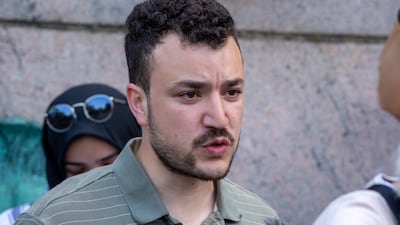A pro-Palestinian activist who helped to lead Columbia University’s student camp movement has been detained by federal immigration authorities despite having a green card.
Mahmoud Khalil was at his university-owned apartment on Columbia's Manhattan campus when Immigration and Customs Enforcement agents entered the building and took him into custody, his lawyer, Amy Greer, told AP.
One of the agents told Ms Greer by phone that they were carrying out a State Department order to revoke Mr Khalil’s student visa. Informed by Ms Greer that Mr Khalil, who graduated in December, was a permanent US resident with a green card, the agent said they were revoking that, too.
US Secretary of State Marco Rubio shared a news report of Mr Khalil's arrest on social media on Sunday, adding the comment: "We will be revoking the visas and/or green cards of Hamas supporters in America so they can be deported."
On Thursday, he had threatened protesters and others who "support designated terrorist organisations, including Hamas".
"The United States has zero tolerance for foreign visitors who support terrorists. Violators of US law – including international students – face visa denial or revocation and deportation," he wrote in a post on X.
US President Donald Trump also pledged last week to cut federal funding for any college or university that allows "illegal protests".
“Agitators will be imprisoned or permanently sent back to the country from which they came. American students will be permanently expelled or, depending on the crime, arrested. No masks," he wrote on his Truth Social platform. Days later, the Trump administration cancelled grants and contracts worth about $400 million to Columbia because of what it described as anti-Semitic harassment on and near the campus.
Mr Khalil has been transferred to an immigration detention centre in New Jersey, his lawyer said. “We have not been able to get any more details about why he is being detained,” Ms Greer said. “This is a clear escalation. The administration is following through on its threats.”
A representative for Columbia said law-enforcement agents must produce a warrant before entering university property but declined to say if the school had received a warrant for Mr Khalil’s arrest.
A State Department representative told The National they could not comment on individual visa cases as records are confidential under US law.
“On March 9, 2025, in support of President Trump’s executive orders prohibiting anti-Semitism, and in co-ordination with the Department of State, US Immigration and Customs Enforcement arrested Mahmoud Khalil, a former Columbia University graduate student. Khalil led activities aligned to Hamas, a designated terrorist organisation,” Department of Homeland Security spokeswoman Tricia McLaughlin told The National.
“ICE and the Department of State are committed to enforcing President Trump’s executive orders and to protecting US national security.”
No information about Mr Khalil's original nationality was released. Al Jazeera reported he is Algerian of Palestinian descent.
During the wave of pro-Palestine protests that took place at universities across the country last year, he was picked to be a negotiator on behalf of students and met frequently with university administrators as protesters tried to persuade the university to divest from Israeli companies and institutions.
When classes resumed in September, Mr Khalil told AP that the protests would continue: “As long as Columbia continues to invest and to benefit from Israeli apartheid, the students will continue to resist.”

